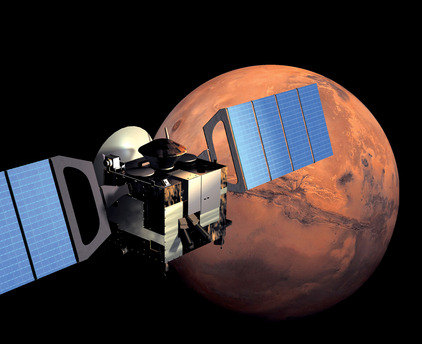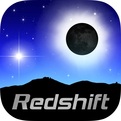Mars Express
 © ESA - Illustration by Medialab |
Since entering its operational, near-polar orbit, Mars Express has operated perfectly, delivering some of the most spectacular and scientifically valuable results ever received from the Red Planet.
Blueberries on Mars
Perhaps significantly, this phenomenon is not unique to the Aram Chaos region. The NASA Opportunity rover discovered ferric oxide deposits in Meridiani Planum, about 650 miles away. The scientists called the deposits ‘blueberries’, because of their spherical shape. Valles Marineris, 2000 miles away, also shows similar deposits. So Mars Express’ detection of ferric oxides in Aram Chaos links together widely separated areas of Mars.There may even be other regions that have witnessed the same accumulation process but now lie hidden from Mars Express’ view. “OMEGA is sensitive to the first hundreds of microns of the surface. So, a layer of Martian dust just a sixteenth of an inch thick will hide the signature from us,” says Marion Massé, Université de Nantes, lead author on the paper describing these results. Fortunately, in many regions of Mars, such as Aram Chaos, wind erosion has blown the dust cover away, leaving bulk rocks exposed.
Although the true extent and nature of the accumulation process of sulphates and ferric oxides remain elusive, the team are now investigating possible hypotheses that could have caused it in the first place. At this stage, they are ruling nothing out. It could be anything from atmospheric precipitation such as rain or snow, to volcanic ashes or glacial deposits.
ESA
Mars Express
 © ESA - Illustration by Medialab |
Since entering its operational, near-polar orbit, Mars Express has operated perfectly, delivering some of the most spectacular and scientifically valuable results ever received from the Red Planet.
Blueberries on Mars
Perhaps significantly, this phenomenon is not unique to the Aram Chaos region. The NASA Opportunity rover discovered ferric oxide deposits in Meridiani Planum, about 650 miles away. The scientists called the deposits ‘blueberries’, because of their spherical shape. Valles Marineris, 2000 miles away, also shows similar deposits. So Mars Express’ detection of ferric oxides in Aram Chaos links together widely separated areas of Mars.There may even be other regions that have witnessed the same accumulation process but now lie hidden from Mars Express’ view. “OMEGA is sensitive to the first hundreds of microns of the surface. So, a layer of Martian dust just a sixteenth of an inch thick will hide the signature from us,” says Marion Massé, Université de Nantes, lead author on the paper describing these results. Fortunately, in many regions of Mars, such as Aram Chaos, wind erosion has blown the dust cover away, leaving bulk rocks exposed.
Although the true extent and nature of the accumulation process of sulphates and ferric oxides remain elusive, the team are now investigating possible hypotheses that could have caused it in the first place. At this stage, they are ruling nothing out. It could be anything from atmospheric precipitation such as rain or snow, to volcanic ashes or glacial deposits.
ESA





